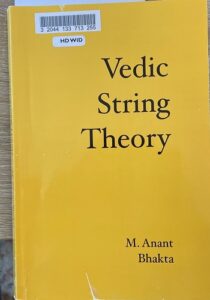The Observer Effect
Vedic and Scientific Point of View
The observer effect is the fact that observing a situation or phenomenon necessarily changes it. Observer effects are especially prominent in physics where observation and uncertainty are fundamental aspects of modern quantum mechanics. Observer effects are well known in fields other than physics, such as sociology, psychology, linguistics and computer science, but none of these other fields have experienced the same level of publicity and controversy as physics.
An excerpt from “The Origins of the Universe: Why Is There Something Rather than Nothing?” featuring Steve Paulson, Neil Turok, Jim Holt, and David Albert. The New York Academy of Sciences Tuesday, October 14, 2014
***
“The Mechanics of conditional experience are all wrapped up with space/time and location, ‘point of view’ and so on. This creates illusions about the universe as well as ‘self’ and has you wondering about things based on this construct. It’s just as much a metaphor or myth, mythic construction, to be thinking as you are based on what scientists have developed as a description based on theory and experiments and so forth up to this date.”
Adi Da Samraj – The Illusion and Danger of Knowledge

The Vedic View:
You begin to see and then there is creation. (Yoga Vasishta)
There is world as long as there is mind. This world ceases to exist as a separate entity when the mind is annihilated. (Jyotibindu Up.)
Scientists’ Views.
The observer disturbs and creates. (Fred Allen, Parallel Universes, p. 180)
Only in our minds is the world made real. (David Darling, Equations of Eternity, p. 64)
Physics is a magic window. It shows us illusion that lies behind reality and reality behind illusion. (Denis Brian, Genius Talk, p. 126)
Unlike the Anthropic Principle –
The anthropic principle is the principle that there is a restrictive lower bound on how statistically probable our observations of the universe are, given that we could only exist in the particular type of universe capable of developing and sustaining sentient life –
– which science cannot unreservedly accept, the Observer Effect is very much science as quantum mechanics is. Physics stumbled into it during its relentless advances in particle physics.
It all began in 1900, when Max Planck published his Quantum Theory, based on which, a quarter century later, physicists developed what can be regarded as the most successful theory in the history of science—quantum mechanics. The wave and corpuscular nature of light was already known to physics since the mid-19th century, but what Planck did was quantifying the wave-quantum (or wave-corpuscle or wave-photon) duality of light.
While the gifts of quantum mechanics are numerous, it raised some fundamental questions. It shattered the Newtonian notion of determinism and instead talked in terms of probabilities. Werner Heisenberg’s (1927) uncertainty principle showed that our knowledge of nature is fundamentally limited—as soon as we catch one part, another part escapes our grasp.
What came as a surprise to the physicists is that, like light, even the fundamental (material) particles like electrons, protons, etc. including whole atoms, depending on the conditions of observation, behave either like particles or waves. This “wave-particle” duality is now an experimentally established fact.
When we say that Newton’s laws of motion and Einstein’s relativity theory are deterministic, we mean that all are connected across time by laws of physics that allow one to determine what happens based on what happened and what will be, based on what is happening now. In contrast, the quantum physics is basically indeterministic, because the observer is inextricably bound to what he observes—the observer disturbs the universe in the quantum world.
According to John A. Wheeler, “quantum phenomena are neither waves nor particles, but intrinsically undefined until the moment they are measured, and the most profound lesson of quantum mechanics is that physical phenomena are somehow defined by the question we ask of them, and ours is, in some sense, a participatory universe.” ((Denis Brian, Genius Talk, p. 127).
This pithily stated remark epitomizes the Observer Effect. The mere act of observation plays a crucial role in determining what is real. The implication is that without conscious participation there is no reality in the quantum world.
Note:
Until the middle of the 20th century the idea of a “participatory universe” would have been regarded as a kind of “heresy” in the scientific world. But now modern physics has come to accept this concept, as it is not inconsistent with quantum mechanics. scriptures of the Eastern religions—the Upanishads, in particular, whose main, nay, the only concern is consciousness.
These new developments tend to lift the veil of mysticism from the scriptures of the Eastern religions—the Upanishads, in particular, whose main, nay, the only concern is consciousness.